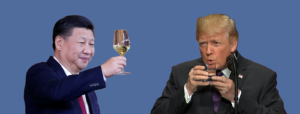Trump finally takes the coronavirus seriously — March 17, 2020

Credit: Evan Vucci/AP / Associated Press
Trump finally takes the coronavirus seriously
In a White House briefing yesterday morning, President Trump unveiled sweeping new national guidelines aimed at stemming the spread of the coronavirus outbreak. He urged all people to keep their kids home from school, to work from home if at all possible, to avoid unnecessary travel, and to not eat or drink in restaurants and bars. He advised not meeting in groups of more than 10 people, and stressed that these guidelines apply to everyone, including the young and healthy, not just the elderly or ill who are most at risk.
“If everyone makes this change, or these critical changes and sacrifices now, we will rally together as one nation. With several weeks of focused action, we can turn the corner and turn it quickly.”
The most recent prior White House briefing, given last Friday, sent markets up 10%, but yesterday he was not so lucky, as markets plummeted 12-13%.
When asked about the economy, and the stock market in particular, Trump said,
“The market — the market will take care of itself. The market will be very strong, as soon as we get rid of the virus.”
On top of this, he stated that social distancing measures and the overall battle against the virus could last until July or August, and “maybe longer.”
Our take: For a President that has repeatedly downplayed the risks posed by the virus, and who has staked much of his legacy on the strong performance of the stock markets (having tweeted about it more than 140 times), his current demeanor towards the public health crisis is a notable evolution. It may be in response to research that put worst-case scenarios at 2.2 million deaths in the U.S. if the outbreak were to go wholly unmitigated.
One big problem: The U.S. still lags extremely far behind other nations when it comes to testing. We have no idea how many cases of the virus are already in the U.S. right now.
Societal impact
Some truly amazing data visualizations by the Washington Post make clear just how and why social distancing and staying at home can make an enormous difference in how hard the outbreak hits society, and how many people die.
Grocery store employees are every bit as much on the front lines as doctors. (Twitter)
Quartz published an interesting piece on how the coronavirus and the massive uptick in time spent at home will lead to more babies…and divorces.
We at The China Project put out a video last week about the potential long-lasting shift in work and school cultures that may emerge from the nationwide work-from-home experiments taking place around the world.
U.S. and global economic trouble just beginning
The Dow Jones and S&P 500 indexes are down almost 30% so far in 2020. Goldman Sachs, a New York investment bank, projects that economic growth for the U.S. economy will be 0% from January to March, and an unprecedented -5% for April and May.
Oil is hovering at or just below $30 per barrel — a price level last seen circa 2003.
Yesterday we reported on auto manufacturers shutting down plants across the globe. Today, it’s airplane manufacturers. Airbus has temporarily shut down plants in Spain and France, as those countries are both in official states of emergency (as is the U.S.). Granted, their problems extend beyond production capacity, as it is unclear what will happen to orders for planes from airlines, if those airlines themselves aren’t growing or are filing for bankruptcy in coming months.
For context: Boeing is the single largest industrial sector stock in the Dow Jones Industrial Average, and it experienced a 24% price drop on Monday alone. U.S. airlines have requested $50 billion of aid from Congress — more than three times as much as they requested after 9/11.
Plot twist (that you saw coming): One company may be growing this year, as Amazon seeks to hire 100,000 delivery and warehouse employees to keep up with demand.
China economy runs out of steam
For decades, China has been the leading contributor to global GDP growth, but that may be about to end. There is growing evidence that China’s economy may have experienced its first outright contraction since 1976, and that it may not be possible to restart the economy so easily as it was stopped to prevent the coronavirus from spreading. (NYT)
China is also the largest trading partner to most nations around the world, meaning that if China enters recession at the same time as other countries face their own problems, it will be exceedingly difficult for anyone to avoid a rough landing. (See McKinsey report here for a detailed assessment of China’s economic relationship with the world.)
The bottom line: While China may have managed to control the outbreak with more success than anyone could have ever expected, it is far from clear that they will be able to successfully control the longer-term impact of the outbreak.
Other China news
- Trump sparks anger by calling coronavirus the “Chinese virus” (Guardian)
- China’s propaganda engine kicks into overdrive as COVID-19 “passes peak” (The China Project)
- A prominent Chinese business person has gone missing after criticizing the government’s handling of the crisis, and in particular the policies of the country’s president, Xi Jinping (The China Project)
- One positive outcome from the virus and its resultant economic shutdown is a cleaner environment (CNN)
- Hong Kong has issued what may be the toughest travel restrictions of any territory in the world. Inbound travelers from anywhere else, other than China, will undergo a mandatory 14 day quarantine. All outbound travel has been strongly discouraged. (Hong Kong Free Press)
Around the world
- The Peace Corps is suspending all activities globally. (Peace Corps website)
- India may be a particularly difficult country in which to control the spread of the disease, given its extreme urban population density and underdeveloped public health and sanitation infrastructure. (Gulf News)
- In India, rumors have gone viral on social media and the internet that COVID-19 is a biological weapon gone awry, and some rumors even place the blame on China. (SCMP)
- 35% of the players, coaches, and staff of the professional soccer team in Valencia, Spain, have tested positive for the disease. (Bleacher Report)
- Japanese government officials have insisted they will not cancel the 2020 Summer Olympics yet, but its citizens are dissenting. (WSJ)
Cure and vaccine radar
- The four ways the coronavirus nightmare could end (Daily Beast)
- A potential vaccine entered Phase I trial testing in the U.S. on Monday. Even under ideal circumstances, and assuming the vaccine is effective, it would still be many months or even a year before the vaccine could be made available to the public. (CNN)
- Coronavirus drugs: Who’s doing what, and when they might come (Yahoo)
- Hopes for coronavirus vaccine rise after Chinese scientists find infected monkeys developed immunity (SCMP)






